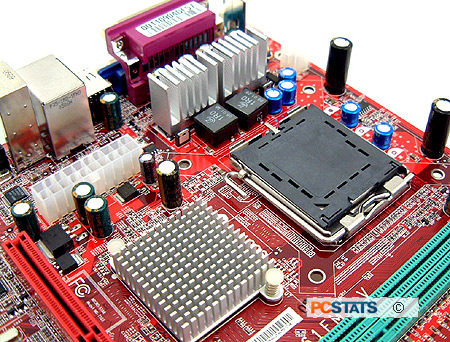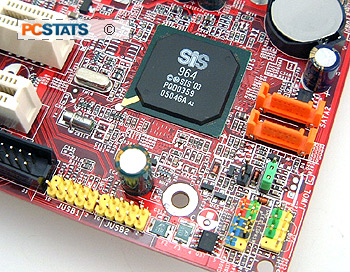It's been a while since we've tested a micro ATX form factor motherboard. The boom
in SFF (Small Form Factor) PCs with tiny motherboards already integrated into their cases has
made the slightly-less tiny micro-ATX form factor boards and the smaller cases that fit them considerably rarer. When you consider that many
motherboard manufacturers (including MSI) are now producing SFF PCs with their
own custom motherboards, you can see why the micro-ATX board might soon be an
endangered species.
On the other hand, there's a
lot to be said for upgradability, one thing that SFF PCs really don't
offer much of. It's good to see that there are at least a few micro-ATX
products out there for users who want small cases but also want to keep their
options open.
Today,
PCstats is looking at MSI's 661FM3-V Micro-ATX motherboard, which is based on the SIS
661FX chipset and SIS 964 Southbridge. This tiny board supports all 533/800MHz
FSB Intel Socket 775 Pentium 4 processors and can hold up to 2GB of DDR
memory in its two slots. Notably, The SIS 661FX chipset does not support dual-channel memory. The 661FM3-V features integrated graphics courtesy of
the SIS 'Mirage' chip, sharing up to 128MB of main memory by default,
but fortunately also implements a full AGP8X videocard slot. Two PCI slots are present for
expansion cards, as PCI Express is not yet supported by the SIS chipset. up to 4 IDE and 2 SATA devices can be added to
the motherboard.
Additional integrated
peripherals are sparse. Only a standard AC'97 audio codec and 10/100
LAN adaptor are included with this budget board. The chipset
supports 8 USB 2.0 ports, though only four are present on the
rear I/O panel. Headers for the other four are found on the
motherboard itself. The MSI 661FM3-V's main feature is it's price, a meager
$80 CDN ($63 US)! Let's see how much value we can squeeze out of this
budget board.
As you can see, The MSI 661FM3-V is a
teeny-tiny motherboard but it's laid out nicely enough. The only
flaw we could point out would be the positioning of the floppy connector directly under
the last
PCI slot at the bottom of the board, but since this sin is shared by almost every
motherboard manufacturer out there, it's not a huge deal.

The large passive heatsinks
that MSI has used on the MOSFETs really stand out, especially when compared to
the rather dinky passive sink cooling the chipset. The SIS 661FX chip doesn't
seem to create much heat though, since this heatsink was barely more than warm
throughout our testing. Overall, the MSI 661FM3-V has a nice quality feel to it
which is reassuring in a budget board. The traditional ATX 20-pin power
connector is used, so the board will be compatible with older ATX power
supplies, provided they have the secondary 12V connector.

The included multi-language manual is well written and
illustrated, but extremely sparse. It skips over some important things
entirely, such as the nature of the integrated graphics solution. For that
matter, the box has no information about this either. We had to check
MSI's website to discover the specs for it. Interestingly, the box also
lists the board as using the 'Intel 661FX + 964 chipset' which I'd imagine comes
as news to both Intel and SIS.
|
Who is SIS?
It's easy to forget about the 'bit-part' players in chipset-land,
including SIS and ALI and even ATI. These companies are not the
first that come to mind when you are thinking about what chipset your next
motherboard should have, but perhaps they should be.
Intel and nVidia have unquestionably dominated the chipset market over
the last three or four years, and VIA, though not the power it once was,
is still an important contributor. SIS, ALI and ATI, while never
dominant, still have important roles to fill in the
marketplace.
Budget prices, integrated features and sometimes refreshing innovation
are all hallmarks of the lesser known chipset manufacturers. For
proof look no further than the SIS 735 chipset, which
successfully brought DDR and SDRAM compatibility together at a time
when DDR was not looking like the sure thing it is
today. Motherboards based on this chipset were some of the
first to feature integrated LAN adaptors, and it enjoyed an active
production life of more than four years, all at prices under $100!
If you are upgrading on a budget, it can be worth it to look at the
smaller names on the marquee. |
Extras included with the board are
also sparse as you'd expect with a budget motherboard. A single 80-pin
IDE cable is included as well as one SATA cable and one floppy
cable. The only other extra is a single Molex to twin-SATA power adaptor.
I'd have liked to see an extra SATA cable or two, or even an extra
USB bracket, but budget boards come with budget expectations.
The SIS 'Mirage' onboard video showed great 2D quality, but was not really
viable as a 3D solution. It lacks hardware transform and lighting
abilities so most modern 3D games will not run with it. This is probably a
good thing, as demonstrated by the scores from the benchmarks we did get to
run. If you are buying the MSI 661FM3-V as a budget integrated board for a
cheap system though, the integrated video is more than adequate for any desktop
task. The video system shares between 32-128MB of main memory.

